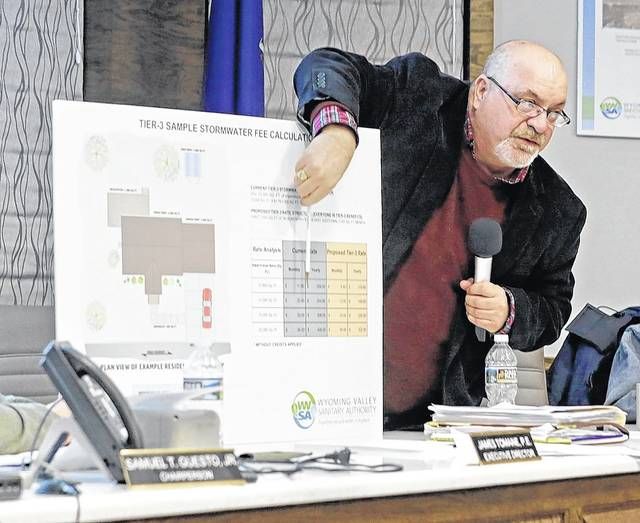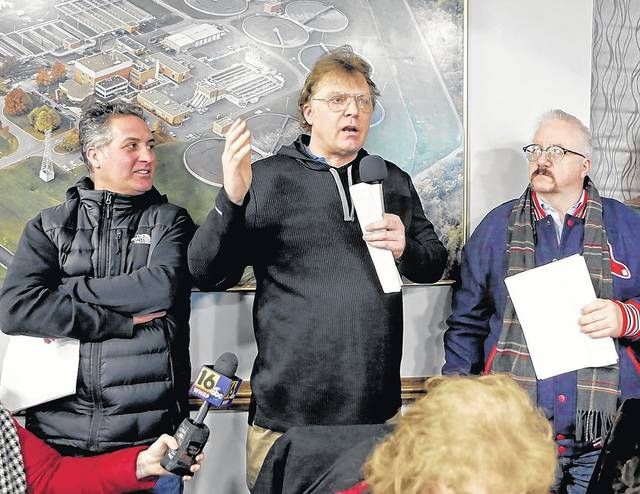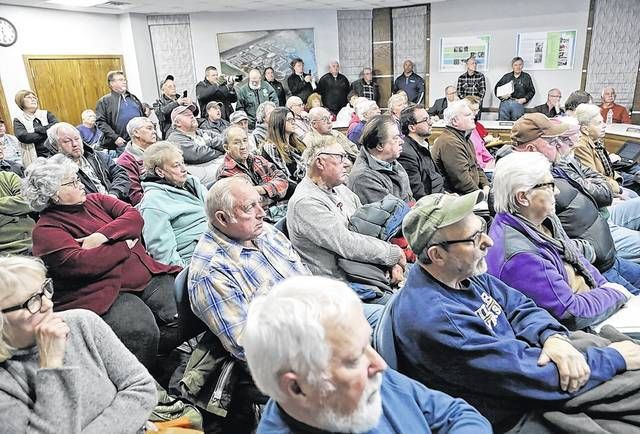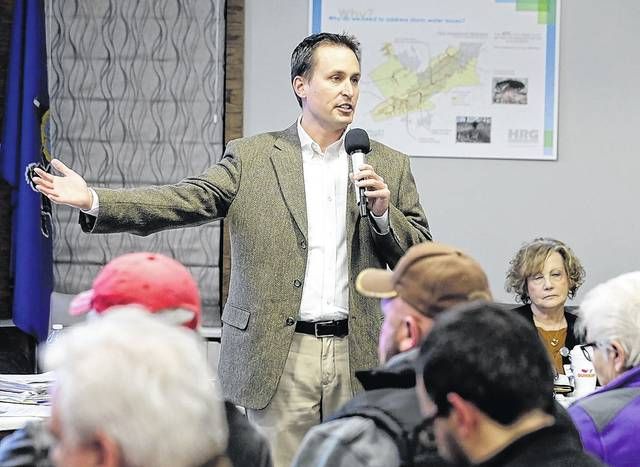Click here to subscribe today or Login.
In a Thursday night meeting that became rancorous at times, Wyoming Valley Sanitary Authority representatives responded to a steady stream of complaints and questions about a new stormwater fee.
Approximately 70 property owners squeezed into the authority’s treatment plant meeting room in Hanover Township for the public information session, which ran for four hours.
The authority board announced and approved several changes Thursday as part of its promise to lessen the impact:
• Under the original plan, the monthly fees were based on these nonabsorbent impervious areas, or IAs, within each parcel: 100 to 499 square feet (tier one), $1; 500 to 6,999 square feet (tier two), $4.80; and 7,000 square feet or more (tier three), $1.70 for each 1,000 square foot of IA.
On Thursday, the monthly tier three charge was changed to $4.80 for the first 6,999 square feet of IA and $1.70 for each 1,000 square foot after that. For example, the monthly bill for a property with a 10,000-square-foot IA would be $9.90 — $4.80 plus $5.10 for the additional 3,000 square feet of IA beyond the first 6,999.
• Instead of requiring property owners to apply, the authority will automatically provide a 30 percent bill credit to “low impact parcels” with IAs that are 10 percent or less of the total parcel acreage and not directly connected to a storm sewer, curb, stream, street or other surface water conveyance.
• A 15 percent credit will automatically be added to bills for properties that are outside “urbanized areas” within each of the 32 municipalities participating in the authority’s regional stormwater plan. Urbanized areas are based on U.S. Census data and a driver of which municipalities must comply with pollution reduction projects to be funded by fee revenue.
• The discount will be increased from 2 to 4 percent for property owners who pay their full-year stormwater fee instead of making quarterly payments.
‘Might as well close’
Due to a public outcry, the authority had announced earlier this month it was delaying the payment due date to March 15 and eliminating all appeal fees for those contesting the authority’s calculations.
While a few citizens spoke in favor of these changes Thursday, many collectively grumbled that they were not enough to appease their frustration over being forced to pay a new bill on top of other property-related taxes and expenses.
The fee was imposed to fund street sweeping, catch basin cleaning, mapping and other projects to comply with a pollution reduction mandate requiring less sediment, nitrogen and phosphorus washed into the Susquehanna River, and ultimately the Chesapeake Bay, over the next five years.
Thirty-two municipalities opted to participate in the authority’s regional project, with the expectation a group approach would be cheaper and eliminate the risk of noncompliance fines.
Some inquiries Thursday were answered by Paul Grella, of the state Department of Environmental Protection, which is enforcing the pollution mandates on municipalities as part of their MS4 permits. These permits are required in municipalities that have separate storm sewer systems that send untreated water to waterways, and failure to comply with requirements could result in fines, officials said.
Consultants also reported the authority has completed the following work in participating municipalities the last six months: swept 655 miles of roadway, cleaned 846 catch basins, repaired 18 catch basins, and removed 1,865 wet tons of sediment — the equivalent of seven railroad cars — to prevent it from reaching streams.
The consultant showed a photo of a catch basin with a plant growing inside it.
Nanticoke resident Rich Novak said the entire state should be funding pollution reduction projects.
Grella said municipalities with MS4 permits throughout the state must comply, and the local regional plan is a “proactive approach.”
Duryea resident Jeffrey Fahey said the regional approach should reduce bills, prompting some boos from a few others in the audience.
Sanitary Authority Board Member Thomas Wall called for civility and said the authority stepped in to help municipalities comply and avoid fines.
“If you want to, we’ll vacate this and then you can go back to each municipality,” Wall said.
Authority Chairman Sam Guesto, who also works as Hanover Township manager, said his municipality would be forced to raise real estate taxes to comply with the mandate.
A woman from Jenkins Township asked why the authority cannot delay billing for six months.
Guesto said the authority was unable to obtain a compliance extension. The consultant said pollution reduction projects, including modifications of water detention basins to filter out pollutants, must be in place by 2023.
Jackson Township resident Richard Manta said his church will be forced to raise dues to pay the fee and “might as well close.”
Representatives of several legislators attended the meeting. A staffer for U.S. Rep. Dan Meuser (R-Dallas) read a letter he sent to EPA expressing concerns about the impact of the fee on area residents.









